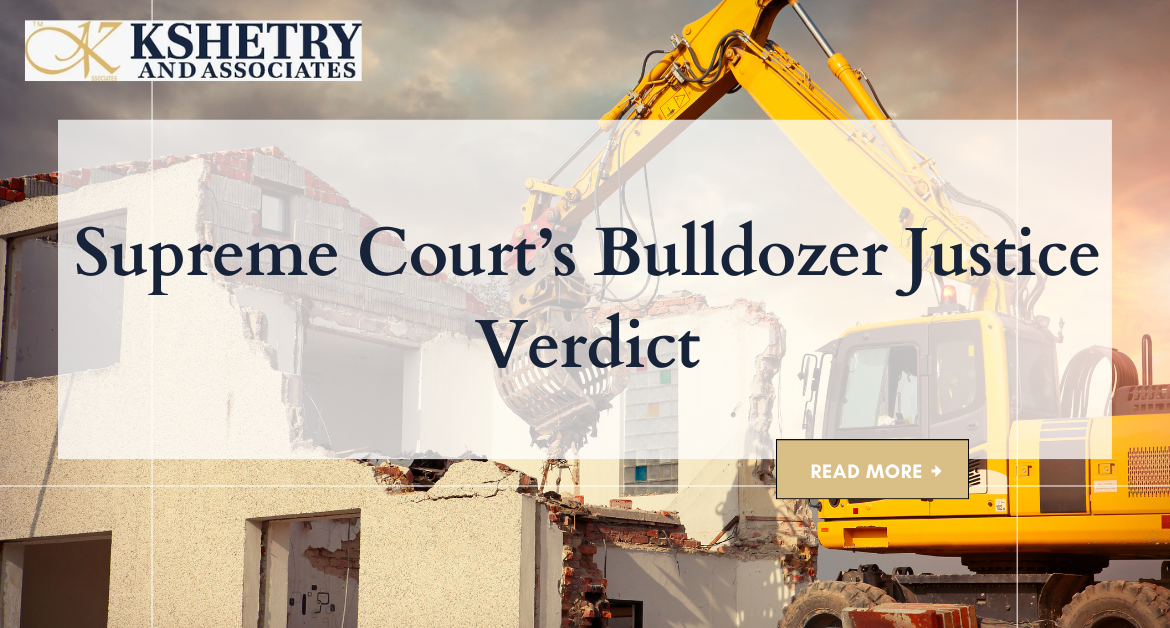The Supreme Court of India rendered a historic ruling on November 13, 2024, addressing what has been referred to as “bulldozer justice.” This is regarding taking down properties connected to people charged or found guilty without following the required legal procedures. According to the Bulldozer Justice Verdict, such acts are unconstitutional, highlighting that they violate fundamental rights and the Indian legal system’s values of justice, equity, and the rule of law.
Supreme Court’s Bulldozer Justice Verdict
In its decision, the Court emphasized several vital aspects that radically changed how properties connected to accused wrongdoers are handled. The primary inferences made from the decision are as follows:
- Deconstruction of Accused’s Property Found to Be Unconstitutional
The Supreme Court declared that employing bulldozers to destroy the homes of those who have been charged or found guilty is unlawful. It ruled that destroying property cannot be excused only because the owner is suspected of committing a crime. The Court emphasised that the executive branch cannot circumvent due process and that arbitrary destruction cannot be used as retribution against a person or their family.
- Violation of an Individual’s Right to Shelter
According to Article 21 of the Indian Constitution, the ruling emphasized that the fundamental right to shelter—a vital component of the right to life—is impacted when homes are demolished. The state violates its constitutional obligation to protect individual rights and dignity by destroying homes without proper procedures and depriving people of basic housing necessities. The Court emphasised that the fundamental right to the shelter cannot be taken away without cause.
- No Collective Punishment for Families
According to the ruling, using demolitions as a form of punishment results in collective punishment that impacts the accused and their family. The Court found this approach unjust since it penalizes people who may not have been involved in the alleged offense. The Court pointed out that democratic ideals and the rule of law, which aim to shield people from capricious official actions, are irreconcilable with collective punishment.
- Executive Not Able to Determine Punishment or Guilt
One of the ruling’s key points was that the executive branch cannot serve as both a judge and an executioner. The Court ruled that any administrative action that avoids judicial review is illegal and that only judicial organizations can decide guilt or administer punishment. This ensures that only appropriate legal procedures are used to administer justice, acting as a check against governmental authorities going beyond their bounds.
- Holding Government Officials Responsible
The ruling also held government employees who permitted or carried out illegal demolitions accountable. The Court showed a solid opposition to the abuse of state power by declaring that officials implicated in such capricious conduct would be held responsible. This clause strengthens the government’s accountability systems and discourages officials from using extrajudicial penalties.
Suggestions
The Supreme Court established several rules to prevent the abuse of demolitions as punishment measures and denounce bulldozer acts as unlawful.
One crucial rule requires that authorities give at least 15 days’ notice before demolishing any property. This ensures property owners have enough time to react, pursue legal action, or resolve complaints through the appropriate channels.
The verdict’s goal is to strengthen India’s judicial and administrative systems’ adherence to due process. The ruling creates clear guidelines for government activities by mandating notice and holding officials responsible, avoiding the abuse of destruction as a form of punishment or intimidation.
Summing It Up
In summary, the Supreme Court’s Bulldozer Justice Verdict strongly affirms constitutional safeguards, individual rights, and the necessity of governmental responsibility. It restates that due process and the right to shelter are essential to India’s legal system, protecting people from capricious and harsh state acts.
Also Read: Calcutta High Court Grants Bail to Gouri Das, Drug Lord’s Wife Amid Legal Controversy

